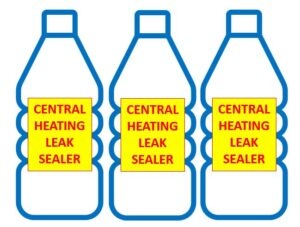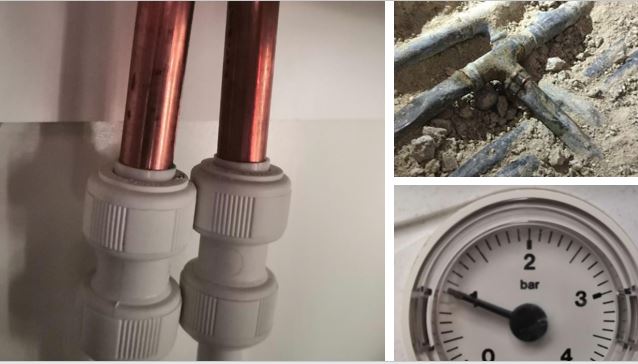Does Central Heating Leak Sealer work?
Central heating sealer can work, but usually only on certain very small, slow leaks. However, we consider it only a temporary fix and not as good a solution as a proper, permanent fix. You may get a result from it in the short term, but it does not remove the hole, crack or gap that causes your leak. You may find that after getting some initial benefit (stopping or slowing a leak) that your leak returns.

Also, related to our previous point, that leak might return in the future, and, having used a central heating leak sealer previously can complicate or affect the work of finding a leak in the future, especially if that work involves tracer gas leak detection. You may find yourself in the situation of saving money in the short term vs costing more in the longer term.
The other thing is that, if you had a leak in your system or are getting an F1 boiler error message, similarly E119 boiler error message or even a F75 boiler error message from your central heating system losing pressure, you would likely want to know what the leak is, where it is, how bad it is and what effect it has had on areas nearby. Using central heating leak sealer ‘blindly’ will likely not tell you that, which we believe is very important.
On these, we have a great Boiler Pressure Low? – Calculator which is simple to use.
On the subject of combi boiler pressure, see our article about how a pressure relief valve (PRV) works and our article about combi boiler leaks.
Should I use Central Heating Leak Sealer?
Generally, we do not recommend using central heating leak sealer. However, there are some cases whereby we consider it an option. For example, if there is a leak in a place which is highly inaccessible and it is going to cause a lot of disruption and cost, it could be ‘worth a try’. That said, those cases are rare and, in most instances there are better options available in our mind.
The other downside of using central heating leak sealer is that, if you have not accessed where the leak is and seen exactly what has caused a leak, it can be very difficult to assess the water damage to your property which, if left, could deteriorate over time and cause other issues. Or come back worse.
The other thing is that you might want to check with your boiler manufacturer and / or installer to see if using central heating leak sealer invalidates your warranty. Better to check these things!

How do you find a Central Heating Leak?
We have a carefully designed process to find where water leaks are occurring in your property, including specific tests to see if it is in your central heating system pipework. Apart from the process, there are many different types of leak detectors tools we utilise to locate the area of a leak and then pinpoint where it is. Once we have worked out that the leak is, for example, within central heating pipework, the following methods come into play…
- Acoustic Leak Detection – to listen for the sounds of leaks
- Pipe Detectors – to trace the path of pipes, especially in hidden places
- Moisture Mapping – to look for the direct and indirect signs of moisture leaks
- Thermal Imaging – especially to help trace hot water pipes and anomalies
- Tracer Gas – used in some instances to spot smaller, trickier or hidden leaks
- Boiler leak investigations – including understanding pressure variances and errors
For more details on these – see our guide to central heating leak detection services.
As we have said previously, many of these are used in conjunction with each other and help compliment each other. It is much better to have evidence from different sources than relying on just one. Plus, there is no ‘one size fits all’ leak detector for finding all leaks in properties.
If you want to have a look at other types of water leak, check our our quick guide to the main sources of water leaks in your home. If you need help with any of these, get in touch with us.
We are experts in finding central heating leaks and work with many of the UK’s biggest insurance companies to offer this service to them and their customers.
Our staff are experienced, well trained and have access to specialist water leak detection equipment to help maximise the chances of finding a water leak at your property. So before you turn to central heating leak sealer, feel free to chat with us first. We are here if you need help, including if you have an boiler F22 error.
On a similar topic, see our quick test of Mr Muscle’s Drain Gel on a partially blocked bathroom sink.

How do you stop central heating leaks?

Like with any water leak in your home or business, the key thing with central heating leaks is to find where they are located, examine how bad the leak is (and the water damage caused) and then, finally, decide the best fix. Somethings this is obvious but other times it can be more complicated as, in some instances, there may be more than one leak.
Is central heating leak sealer a permanent fix?

If you are looking for a permanent and robust method to resolve leaks in your central heating, we do not consider central heating leak sealer the best option. It may be quick and cheap but, in our opinion it is not as good as a proper process where you find the leak location (otherwise you many now know what the damage is). Then an appropriate, more permanent fix can be made with likely longer-term benefits.
How can I seal a water leak?
In order to seal a water leak, the first challenge is to locate where the water leak is. This can tricky in some situations as you may know you have a leak but are not certain of the location. This is where water leak detection specialists like us come in. Once a leak is found, you can then determine the best repair to seal the leak and prevent damage to your home or business.
